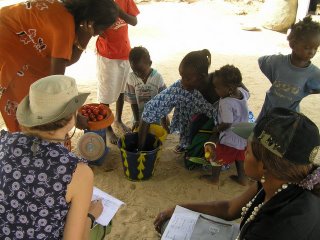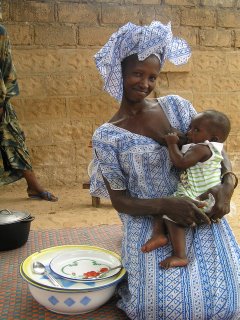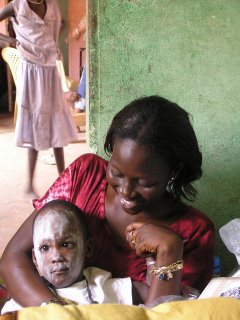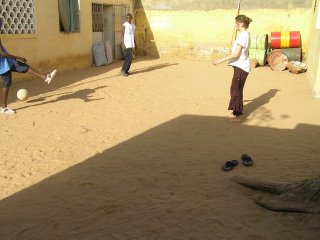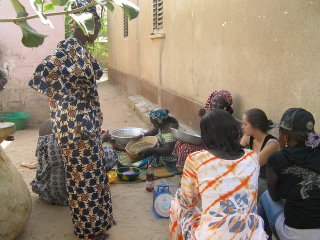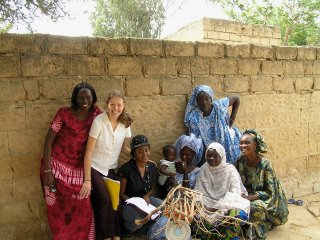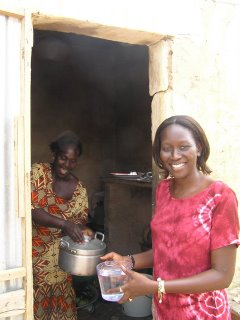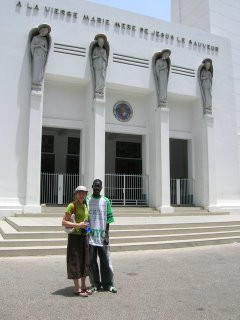Holy cow, it's almost July
I woke up this morning with a sore throat, and really just didn’t feel motivated to do anything. Max knocked on my door, as he usually does, after he rolled out of bed. His room is pretty close to mine and he wakes up when he hears my creaking door open at 7:15 and then creak back shut, as I leave to use the bathroom in the back yard. We usually exchange quick greetings in French because he’s used to speaking that with me, but this morning he used Wolof to tell me he was about to get dressed and that he’d be right back. Our shower is indoors and it’s the only thing in a small, tiled room that connects to the downstairs foyer. I took a quick shower, not washing my hair, because it is in high demand in the morning, especially around 8.
A couple of times I’ve gotten up at 7 to run along the beach with my 24 year-old brother Ouzin. I was telling Jeff a couple days ago that living with Ouzin is like having Bill Cosby in your house. He is extremely modest but very silly. And he goes well out of his way to make me laugh and laugh at my bad jokes too. He runs most days before it gets hot out and I’ve enjoyed joining him. The first time was really awkward for me. I hadn’t worn shorts in public yet, and wasn’t sure it was a good idea, since most women are so elegantly dressed in public. To get to the beach, we have to run through town, dodge sleepy taxi drivers, horse drawn buggies hauling butane bottles to stores, children running out to get the bread for breakfast, etc…I felt so completely alien! I felt everyone’s eyes on me. I asked Ouzin if it was socially OK for me to be sweaty and in sporty clothes in public and he insisted it was. What’s more, I’m running in Tevas since I didn’t bring sneakers, and although it’s been totally working fine for me, the fact that I’m not wearing training shoes like all the other sporty people just draws more attention to me. Well, by my second time running, I was used to having deep stares come my way, understanding a little more that it’s really just that people are curious and don’t mean to be impolite; it’s not impolite here to stare! What’s more impolite is to ignore others. We get to the beach after running through some rubble at the far end of town and pass the fishing boats that have been there for eons (Yoff is an ancient fishing village which is slowly being swallowed by the suburbs of Dakar) and we get to the magnificent beach. We run for 10 minutes which is plenty for me. Running in the sand is hard work. I feel great when I get back and usually everyone gives up their place in line for the shower, knowing I should be at CRESP by 9. I am grateful.
Max comes in my room with a pot of boiled water and two half-baguettes, and I pull the tub of margarine and pot of sugar cubes out of my cupboard. Everyone keeps their own mug and small spoon for breakfast in their rooms. We sit on my blue carpeted floor and he puts the Lipton tea bags in the mugs and pours the water. I unwrap the bread and get the butter ready. He carefully wrings out each tea bag, it’s an art really, by wrapping the bag with its own string and pulling it taught in several places. He does this everyday, so carefully! We’ve joked a few times that we are like an old married couple, sharing a quiet breakfast together each day. He insists that it’s the little things in life that make him happy, and he hopes to continue this dance with his future wife someday, pouring her tea, cutting her bread, etc… I guess I’m good practice for him, and I love it!
CRESP is a 15 minute slow walk down the auto route, in the hot sun. Max works for CRESP too as a helpful hand, running errands and mailing packages. My brothers Ouzin and Coday also work there behind the front desk at the cyber café. My host dad works upstairs as a co-director. The unemployment rate is around 70 percent in Senegal. Families are large, and parents do not always prepare nor encourage their kids to work. Kids will often live at home till they’re 35, just sharing floor space / bed space with a brother, eating meals and hanging out with the family, having few other expenses. Everything else is shared! So, it’s good for this family that so many of the kids are working, even though society sure isn’t pushing them to do so.
My younger sister Mantou is 18 but she’s tall and sophisticated and hysterical. She’s in charge of doing a lot of the cooking in the house and the laundry on Saturdays, chores that the boys are not given, which sometimes reminds me that it is very much a stratified society in terms not only of economics and race but also sex. My host family is loving and welcoming and wonderful, and there are deeply rooted traditions, like the women handling almost everything menial, which aren’t questioned.
Mantou, Aisha, Anne, Libas and I went to the beach last weekend and had a good time. She’s constantly teaching me new Wolof words and is patient when I stare at her blankly, not knowing what she’s just garbled in Wolof.
Otherwise, this week has been pretty relaxing; I’ve had a couple meetings with the local tech university, Ecole Supérieure Polytechnique and their solar energy department, and with Marian’s lead, we have discussed with them the possibility of bringing on one of their master’s students to work on the solar oven energy audit, so that I would not have to work alone on collecting more data in Mékhé and analysing it later. They’re going to put out a job offer today and hopefully we’ll reel someone in.
In the meantime, we’ve come up with a tentative methodology for what data we’ll collect from about 50 oven-owning families. We’ll use the help of trained women in the village to collect the data, making the study very much a part of their own project and incorporating their expertise and responsibility. It will probably be another couple of weeks before the next stay in Méhké, giving us time to plan.
I’m borrowing Julia’s digital camera for the next few days (thanks Julia) and I’m going to take pictures of everything I see. Enough of this not having a digital camera crap! Hopefully you’ll soon see Yoff with your own eyes, En Sha Yallah (God willing!).
Everyone’s really nice here and supportive of my slow learning curve with Wolof, but at times I get frustrated, feeling like I’m being constantly tested, wishing that they would just stick to French with me. I do my best to smile and politely ask them to repeat, making care to try and learn the expression for the next time we meet. Because oh man, if you don’t make the effort, you really get it! The past few days I’ve been resting my brain, quietly resorting to my room to read in the evenings, not seeking out others. I think I’ve needed it, to get away from the incessant tests all around me, and I’ve certainly taken Anne up on some good cathartic whining sessions. Overall, I feel so much better when I’m honest about my state and what’s going on. I can’t be happy here all the time and I need time to myself. Done and done.


